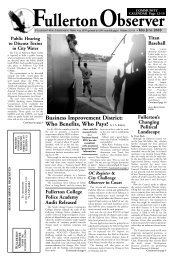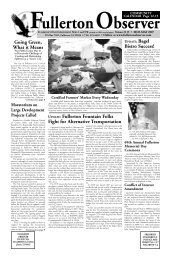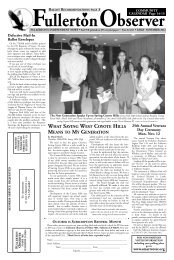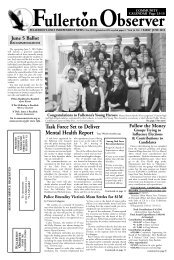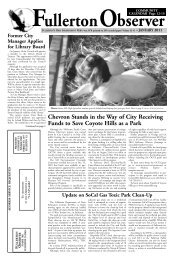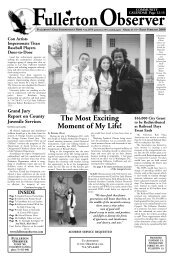Download - Fullerton Observer
Download - Fullerton Observer
Download - Fullerton Observer
You also want an ePaper? Increase the reach of your titles
YUMPU automatically turns print PDFs into web optimized ePapers that Google loves.
EARLY-MARCH 2009<br />
More Bad News<br />
Picking up where I left off in the Mid-<br />
February issue (See: www. fullertonobserver.com),<br />
news is in trouble and newspapers<br />
in even more trouble. And yes, I<br />
am aware of the irony that in my first sentence<br />
I named the problem, the cause of<br />
our immanent demise, and I thereby exacerbated<br />
it. I referred you to the Internet!<br />
Now I am not so old that I hate or fear<br />
the Internet. I am relatively net and computer<br />
savvy; but if I am a convert, I am a<br />
recalcitrant convert and not filled with the<br />
convert’s traditional zeal. I<br />
accept the inevitable but do not<br />
joyously surrender.<br />
Newspapers are, in fact,<br />
doomed. We will not be<br />
spilling ink onto dead trees,<br />
driving them around town and<br />
then hurling them onto driveways<br />
in the future—in the very<br />
near future. The demise of<br />
newspapers is ordained but<br />
they have participated in moving<br />
the date up. Instead of jogging,<br />
eating low fat and getting plenty of<br />
rest, newspapers have feasted on a high<br />
fat, high sugar diet of empty calories and<br />
burned both candles and bridges at both<br />
ends.<br />
Our city dailies could have prolonged<br />
their useful lives if they had remained<br />
family owned. They could have made<br />
money on their original cost basis. But<br />
once large groups started buying and consolidating,<br />
the die was cast. The<br />
Chandlers would be making money on<br />
the LA Times. However, when the<br />
Tribune had to pay the retail purchase<br />
price, the income of the Times couldn’t<br />
support the debt. Then Zell bought the<br />
Tribune, and even after leveraging their<br />
pension plan, can’t service his debt. Yes,<br />
profits would have fallen for even original<br />
owners because of the movement of<br />
advertising to the net—to Craig’s List and<br />
eBay. But the papers could have lived<br />
longer.<br />
Word is out that Hearst is looking to<br />
sell or close the San Francisco Chronicle.<br />
It is already in a semi-partnership with<br />
MediaNews, out of Denver, which is also<br />
having debt service problems that threaten<br />
the existence of a hundred newspapers<br />
in its shrinking empire. Their individual<br />
local papers might have thrived had not<br />
the empire expanded and, like our other<br />
bubbles and empires, burst.<br />
So now the large dailies and the smaller<br />
semi-local chains are cutting back. They<br />
are reducing pages, letting go their most<br />
senior writers and editors and taking more<br />
and more syndicated and news-service<br />
material. The city dailies, large and small,<br />
are losing their connection to their communities.<br />
They are losing talent, content<br />
and context.<br />
Out of My Mind<br />
AUGUST JonDobrer@mac.com<br />
2008<br />
by Jonathan Dobrer © 2009<br />
In a desperate effort to stay technically<br />
alive, they are (in corporate-speak) “merging<br />
their synergies” and moving their<br />
community staff people to central locations.<br />
No one is left to cover the high<br />
school play or sports. No one is going to<br />
PTA meetings or to the city council. One<br />
paper is trying to cover Pasadena City<br />
Council meetings by web cam to a<br />
reporter in Mumbai. No, I’m not making<br />
this up.<br />
This is a doomed strategy. LA Times<br />
raised its street price by 50% while cutting<br />
back on pages and killing their separate<br />
local section (named California until<br />
March 1, but was also Metro,<br />
Orange, Valley and<br />
Westside). As you read this,<br />
it will have been merged in<br />
front with already merged<br />
Op-Ed and editorial. The<br />
biggest decision left to the<br />
suits in the executive suites at<br />
the Times is where in the<br />
world to put their obits? This<br />
is one still profitable part of<br />
print. Do you put it in the<br />
front, in the sports, the business<br />
or entertainment? There is serious<br />
executive time being devoted to where the<br />
obits will go as (and you could see this<br />
coming, right?) they should be preparing<br />
their own obit.<br />
This is sad but unavoidable. There is little<br />
point in fighting for the preservation of<br />
the buggy whip manufacturing industry,<br />
teaching Morse code, or trying to resuscitate<br />
Generalissimo Franco. Dead is dead.<br />
This is not a tragedy, just sad in its prematurity.<br />
I don’t want to sound like the<br />
last carver of cuneiform, “Those kids.<br />
What value is ink on papyrus? It is lazy.<br />
Only carving in stone has lasting value.”<br />
Well, yes, ink feels better, more permanent<br />
and real than electrons, but that is a<br />
generational feeling. The news can be as<br />
good or better electronically delivered.<br />
There is no a priori superiority of ink over<br />
electrons. The deeper issue is content.<br />
Who will pay reporters to gather information?<br />
Who will fact check and edit?<br />
Who will decide what news is important?<br />
The news needs professionals for the coverage<br />
of national and international news.<br />
As for local, well, the local and hyper-local<br />
papers do just fine. They (we <strong>Observer</strong>s)<br />
cover the local theatres, school board, city<br />
council, crimes, water quality and housing<br />
issues just fine.<br />
In ten years city dailies will be gone.<br />
Maybe there will be two printed national<br />
papers (New York Times and USA<br />
Today), the weekly national magazines<br />
will be monthly but local papers with<br />
local advertisers will still be around. They<br />
will never make a fortune, but unless they<br />
are so foolish as to merge, they will be economically<br />
viable. And that, finally, is<br />
some good news.<br />
Who will pay<br />
reporters<br />
to gather<br />
information?<br />
Who will<br />
decide<br />
what news is<br />
important?<br />
WAR COSTS in Life & Money: YEAR SIX<br />
• $600 Billion<br />
• 90,777<br />
• 4,250<br />
• 45,298<br />
• 660<br />
IN IRAQ<br />
Cost of The War in Iraq -rounded down ($341.4 million a day)<br />
www.costofwar.com (02/12/2009)<br />
Civilians killed by military in Iraq<br />
www.iraqbodycount.org (02/25/2009)<br />
US Soldier Deaths in Iraq: (DoD 02/25/2009)<br />
US Soldiers wounded<br />
*(DOD 02/18/09) www.icasualties.org/oif<br />
IN AFGHANISTAN<br />
US Soldiers killed (02/26/09) www.icasualties.org/oef/<br />
VIGNETTES<br />
by Natalie Kennedy<br />
How We Made it<br />
Through the<br />
Depression<br />
One of the earliest memories I have is<br />
that, Herbert Hoover was not only the<br />
greatest president ever, but by golly, he<br />
looked a lot like my Dad. My father<br />
claimed to be an "Independent." But, as I<br />
grew up I noticed that all my dad’s choices<br />
happened to be republicans. I tell you<br />
this because my fourth year of life was the<br />
same year Hoover became president. We<br />
thought this was great. My parents were<br />
on top of the ladder financially, as my dad<br />
was treasurer of Massachusetts Fire<br />
Insurance Co. We had it all. We had<br />
moved from Rhode Island to<br />
Massachusetts years before for my dad’s<br />
great job.<br />
The next five years were a horror story.<br />
It was the Great Depression in the US.<br />
My dad and everyone we knew lost their<br />
work and all their savings. It took us a<br />
while to sell our rather spacious home on<br />
3 acres of land for half what we had paid<br />
for it. My folks decided we should go<br />
back to Rhode Island, where at least there<br />
would be more jobs.<br />
A dear old friend owned a nice<br />
Victorian home. His family lived on the<br />
2nd floor and he offered us the 1st floor as<br />
guests 'til Dad got a job. The next years<br />
were job hunting years and we heard very<br />
little about the president that looked like<br />
Dad.<br />
We settled in. Roosevelt became president<br />
in 1933. Streets were still full of<br />
bread lines and sadness was here too. But<br />
for us kids it was O.K. Our parents and<br />
our good friends made the difference.<br />
In the mornings my mother would be<br />
up first, shoveling coal into the furnace.<br />
Then we all had hot oatmeal cereal (all we<br />
wanted). Our neighborhood was full of<br />
fruit trees and we all shared and enjoyed<br />
peaches, plums, apples, and cherries. We<br />
planted food. I especially remember our<br />
wonderful tomatoes, corn, and more.<br />
My silent suffering mother baked cupcakes<br />
and doughnuts to sell, which my sister<br />
Phyllis and I delivered on our bikes to<br />
neighbors who seemed to love them. Our<br />
neighbors were mostly older and not quite<br />
as hard hit as we were. Mother kept<br />
telling us the good things that the money<br />
would be used for, plus what great fun it<br />
was doing it. I remember thinking as<br />
long as we had our parent’s love, my dolls,<br />
MUSINGS<br />
by Gene Walsh<br />
American Culture?<br />
Following WWII and through the Cold<br />
War, the United States, Russia, and China<br />
have vied for world leadership. We have<br />
seen the USSR lose some of its role with<br />
the break up into separate independent<br />
states but Communism remains strong in<br />
many parts of the world including China.<br />
American culture has been expanded by<br />
US business enterprises and by (not<br />
always successfully) our use of our superior<br />
military force to convert the world to<br />
“democracy.”<br />
However, the expansion of KFC,<br />
Starbucks, and hamburger chains is not<br />
what American culture is all about.<br />
Should we not be exporting our living<br />
standards, ideas of freedom, educational<br />
systems and tolerance as the way to a bet-<br />
<strong>Fullerton</strong> <strong>Observer</strong> Page 3<br />
and my great metal doll bed, all was well.<br />
Mother made all our clothes. It seemed<br />
like when kids at school wore long dresses<br />
we wore ours a bit shorter and when they<br />
had short short dresses ours were a bit too<br />
long. But my mom made sure we had<br />
nice dresses and we spent most of our<br />
doughnut money on good oxford laced<br />
shoes.<br />
Dad was brought up in Providence and<br />
his fisherman friends gave him fish every<br />
night----so we had a good supper right<br />
before bed. Hood Milk Company delivered<br />
a huge can of milk to us about every<br />
3 days (it had a couple of quarts of cream<br />
settled on top). My dad promised to pay<br />
everyone back when he could and he<br />
eventually did just that.<br />
One of my dad’s first job offers was<br />
from Narragansett Brewery. He came<br />
home and at dinner told us we had to vote<br />
on whether he should take the job because<br />
he had to accept or reject the offer the<br />
next morning. Poor Dad who was silently<br />
hoping that there might be an exception,<br />
was faced with a “No” vote from the<br />
family and had to turn the job offer down.<br />
To explain that no vote, I must go back<br />
to Nova Scotia, back into MacLean history.<br />
You see my grandmother was the big<br />
wheel of the "Womans Christian<br />
Temperance Union" and had trained her<br />
family and their offspring that alcohol was<br />
the root of all evil. Now, we might starve,<br />
but we all knew that you have to put<br />
beliefs first.<br />
The next day Dad went down and<br />
signed up for W.P.A. and was immediately<br />
hired as an accountant at the Newport<br />
Naval Station in South County, R.I. It<br />
was the beginning of a hard won comeback!<br />
My dad had to go through bankruptcy<br />
but in the end he paid all the companies<br />
back and received many awards for<br />
it, thereby regaining some of his pride.<br />
Well, in our house Roosevelt became our<br />
hero and dad had at last proved he was an<br />
Independent after all (not to be confused<br />
with democrat).<br />
Thank you President Roosevelt for the<br />
“Works Progress Administration.” The<br />
WPA not only brought us new infrastructure<br />
but put people back to work on jobs<br />
they could do best. There were even jobs<br />
for music teachers and actors to train children.<br />
I took piano lessons that I could not<br />
have afforded while these artists could still<br />
share their gifts.<br />
Eventually my dad started a real estate<br />
company and we bought a home. He<br />
swore he would never leave Rhode Island<br />
again...but when I got married and moved<br />
to California, Mother and Dad decided to<br />
come also. Then our whole family followed<br />
and we all ended up here!<br />
ter more peaceful world? This morning I<br />
read two stories in the LA Times which<br />
made me question if the articles reflected<br />
American culture and what we really consider<br />
important.<br />
Number one was headed, “Schools are<br />
struggling with cuts.” It said “Districts<br />
across the state face decisions to lay off<br />
teachers, increase class size and eliminate<br />
programs.” Our society is in a recession<br />
and we refuse to sacrifice (by paying taxes)<br />
to educate the next generation. Does this<br />
mean Americans will fall behind the rest<br />
of the world in technology, research and<br />
our standard of living?<br />
Number two was in the sports section,<br />
“Carroll of USC tops salary list.” Football<br />
coach Pete Carroll “earned $4.4 million in<br />
total compensation, four times as much as<br />
USC President Steven B. Sample.”<br />
Enough said! Our culture apparently<br />
places more value on a football coach than<br />
it does on educating its next generation of<br />
citizens, and we expect to continue to be a<br />
world leader?



